Faith and Politics
Days after a cross-country FBI operation arrested 152 sex traffickers across the U.S., Joel Osteen, senior pastor of Lakewood Church in Houston, Texas, announced his support for a bill in the House of Representatives aimed at eliminating human trafficking rings. The Christian Post reports:
The bill, which is supported by both Republican and Democrat lawmakers, is intended to help eliminate human trafficking rings by "targeting the criminals who purchase sexual acts from these organizations and ensuring that they are prosecuted as human traffickers."
"The suffering associated with human trafficking resonates strongly within the Christian community, and we know of many churches, like our own, whose compassion for its victims has moved them to act," said Joel and Victoria Osteen in a statement.
Read more.

I SPENT MY first year after college doing voluntary service in Portland, Ore., serving as the hunger action coordinator for a small Catholic organization called the Oregon Center for Peace and Justice. That fall, I joined a group of church anti-hunger activists from around the state in a meeting with our Republican U.S. senator, Mark O. Hatfield. We asked him a number of questions, and urged his continuing support for food- and hunger-related legislation.
When it came my turn, I said, “Senator, how do you reconcile the compromises that you inevitably have to make as a politician with the ideals you hold as a Christian?” In his reply, Sen. Hatfield pointed to the difference between compromises of principle—which he said he would never make—and the tactical compromises necessary to make progress in a pluralistic society. Without the latter, the senator said, politics is nothing but an ideological shouting match.
These days, it’s clear that most far-right Republicans, including those in the party’s leadership, take a slightly different approach to inter-party cooperation than did the late Sen. Hatfield. They seem to see it less as building bridges for the sake of governing a varied society and more as sleeping with the enemy.
There’s probably no better recent example than the issue of health care. The Affordable Care Act, aka Obamacare, is the law of the land—passed by Congress, signed by the president, and ruled constitutional by the Supreme Court. But none of those legal niceties seem to matter to the raw-meat GOP. Their attempts to circumvent or undercut the law range from the inane (such as 67 failed tries—count them: 67—to overturn the ACA by congressional vote) to downright bullying.
MY FIRST GUIDED tour of Indianapolis was with a real estate agent, crisscrossing the city in his gleaming black Lexus. He spoke as he drove, filling the air with phrases such as, “Now, this is a terrific neighborhood,” and “You’ll want to steer clear of that one over there.”
As you’d guess, he focused on amenities, or the lack of them: hip restaurants, nearby shopping, nice parks, great schools. Security and consumables, good neighborhoods and bad. A mental map of the city took shape as we drove.
My second tour, just a few days later, was quite different—so different that it changed my life. This time the guide was one of the faculty members at Christian Theological Seminary, the school where I had just been appointed president. She’d lived in the city for more than 20 years, and on her tour, consumables came up now and then, but they took a definite back seat to the creative, groundbreaking ministries going on around town.
Her remarks frequently echoed the real estate agent’s, but from an entirely different angle. She’d say, “Now, this is a low-income neighborhood and a food desert [a section of the city where nutritious, affordable food isn’t readily available]—and right there on the corner is the amazing little church that’s started an organic community garden ministry.” Then a few minutes later: “Now, this is a middle-income neighborhood—and there’s the mosque that’s making a tremendous difference through its youth program.” And so on.
THE LEADERSHIP of 12Stone Church, a multi-campus congregation based in Gwinnett County, Ga., became increasingly concerned about how home foreclosures, rampant unemployment, and other financial strains were impacting families in metro Atlanta. They set an ambitious goal of providing relief to 5,000 families in their church and community. Eventually they raised more than $550,000 through designated gifts, many from church members who were themselves unemployed.
Partnering with the HoneyBaked Ham Company, Kroger grocery stores, and other area sponsors, the 12Stone Church members distributed food to needy families, culminating with a day of giveaways in the parking lot of Coolray Field, home to the Gwinnett Braves, the local minor league baseball team. People began lining up hours before the event, jamming traffic on nearby I-85. Others slept in their cars overnight to keep from missing out.
Imago Dei Church in Raleigh, N.C., has mercy ministries built into the DNA of the church. They’ve adapted Rick Warren’s PEACE Plan: plant churches, evangelize the world, aid the poor and sick, care for the orphan and the oppressed, and equip leaders.
Working through the Raleigh-based nonprofit Help One Now, Imago Dei is partnering with an orphanage in Haiti and sponsoring children. Through this ministry, the church is providing basic needs, including food, clean water, and health care. They also support education programs so that the children will be equipped to one day provide for their own families.
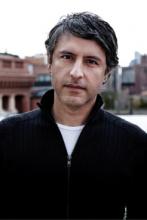
NASHVILLE, Tenn. — For the third time, Jesus is about to change Reza Aslan’s life.
As a teenager, Aslan turned to Jesus in an evangelical youth group, where becoming a Christian made him feel like a real American.
He later studied Jesus of Nazareth in college, which led Aslan to a doctorate in the sociology of religion.
Now Aslan’s controversial new book about Jesus is about to make him a best-selling author. Zealot: The Life and Times of Jesus of Nazareth has already reached No. 1 on Amazon.com. It’s expected to debut this weekend on The New York Times’ best-seller list, becoming the latest in a long line of controversial and profitable books about the so-called historical Jesus.
Aslan said he wants to show the power of Jesus as a flesh-and-blood human being, rather than the savior of the world. That Jesus has gotten lost in 2,000 years of church history, he said.
RIGHT FROM THE beginning, John Carr saw Pope Francis as a “great sign of hope.”
Carr, who spent more than two decades as the U.S. bishops’ top peace and justice officer, was home, working at his kitchen table, when the white smoke came up announcing the selection of the new pope. “I thought, ‘Oh, my,’ and this guy I didn’t recognize came out,” Carr said. “When he said the name ‘Francis,’ I thought ‘it’s going to be okay.’”
As executive director of the Department of Justice, Peace, and Human Development at the U.S. Catholic bishops’ conference, Carr carried a rather large portfolio. He often tells the story of being introduced by a man who said, “He’s in charge of social development and world peace.” The man’s wife, in Carr’s telling, looked at him and said, “You need to do a better job.”
Since leaving the bishops’ staff last year, Carr has launched a new initiative, based at Georgetown University, aimed at helping lay people “become more informed and engaged in their vocation to be ‘salt, light, and leaven’” in public life. Carr, who visited Sojourners’ office this spring, is encouraged that the election of Pope Francis “has provided incredible visibility, urgency, and passion” around social issues. “When he was going to be elected, his friend said, ‘Don’t forget the poor,’” Carr explained. “A church that moves to the edge to care for the weak and vulnerable is a church you want to be a part of.”

For Catholics—and many others—what happens in Rome doesn’t stay in Rome. The seating of a new pope has the power to affect believers across the globe, in ways direct, indirect, and unpredictable. And when a surprising sea change occurs in a hide-bound, steeped-in-tradition place like the Vatican—the unexpected resignation of a pope, the selection of a Jesuit from the Americas as his replacement, and the powerful symbolism of a new leader who literally stoops to wash a Muslim woman’s feet—people of faith of all traditions sit up and take notice.
In these early days of Francis’ papacy, we asked three prominent Catholic thinkers and leaders to help us understand what it all might mean. How will the spirit of reform that has marked Pope Francis’ first few months in office affect the worldwide church? Will change at the top trickle down to parishes and neighborhoods here in the United States and elsewhere? And what will Francis’ leadership mean not only for Catholics, but for all people of faith engaged in the work of making justice and building peace? —The Editors
CATHOLICS AROUND THE WORLD are transfixed by Pope Francis. We love his simplicity of life, his humble faith, his welcoming attitude to all, and his way of being Christian in the contemporary world that takes its bearings from the poor. Lace and gilt are no longer fashion statements at the Vatican. From his small apartment, the pope speaks bluntly about worrying less about rules and more about love. An utterly refreshing breeze blows through the Catholic Church.
But what does it really mean for Catholics today? The church still reels with the moral and spiritual damage done by members of the clergy as perpetrators or accomplices in the sex abuse scandals, from fiscal mismanagement, and from institutional infighting. Does Pope Francis change that? And what does the new pope signify for the young, for women, and for the many issues that vex the church’s engagement in today’s world?
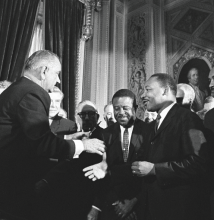
BACK IN THE day, when Stevie Wonder was Wishing “those days could come back once more,” my 6-, 7-, and 8-year-old friends and I had no idea what the heck he was talking about, but we loved the groove and would blast Wonder’s Songs in the Key of Life album from our front steps as we played in front of my house in our West Oak Lane neighborhood of Philadelphia.
Sometimes the boys would coast down the street on handmade skateboards, literally made of old skates—the kind with wheels you strapped to your shoes—nailed to short wooden planks. Sometimes the girls and boys would race each other down a steep street, flying at lightning speed on bikes and boards, to see who could make it first to the candy shop at the bottom of the hill. And sometimes, in all the play, a verbal sparring match would break out:
“You so big,” one friend would say, “it take two showerheads to clean yo big butt in the morning!” Then the 7-year-old sparring partner would come back: “Oh, yeah?! You so ugly, yo mama say ‘What dat?’ when she give birth to you!”
It would keep going and we’d all laugh out loud until someone got inappropriate. Usually inappropriateness began with three words: “Yo mama so ...” We all knew to never bring someone’s mother into the sparring match unless you wanted to fight for real. Those were fighting words.
This summer the Supreme Court got inappropriate. They spewed fighting words on the playground that is our national public square.

THOSE WHO BELIEVE in freedom and work for justice in our world sometimes grow nostalgic about the 1960s in this country, looking back at the leadership that emerged from African-American churches in the South, drawing allies from outside the region and beyond the bounds of creed. America has a vivid, living memory of faith inspiring public justice. But the civil rights movement did not just happen. The March on Washington and Selma were moments in history made possible by movements that grew out of hard work over the course of decades.
This summer in North Carolina, “Moral Mondays” at the state General Assembly have drawn thousands of weekly protesters, more than 800 of whom have been arrested for engaging in mass civil disobedience. A few weeks into the campaign, some elders started saying it felt like the ’60s all over again. The Washington Post highlighted NAACP state chapter president Rev. William Barber’s dynamic preaching. The New York Times pointed to the significance of hundreds of clergy uniting to lead the movement. MSNBC andFox News set up their satellite trucks. Week after week, thousands of people kept coming.
When reporters asked why, participants explained the concerns: 500,000 people denied health care when the legislature refused federal funds for Medicaid expansion, 70,000 people whose unemployment insurance was cut off, thousands of poor families denied an earned income tax credit, wholesale repeal of the hard-won Racial Justice Act, and diversion of public education funds through a voucher program. The reasons were legion, but they were not, by and large, unique to North Carolina. They were the sort of changes the American Legislative Exchange Council (ALEC) promotes at the state level throughout the country. How, then, did this grassroots resistance movement emerge in North Carolina?

THIS SUMMER, two Supreme Court outcomes dramatically affected the reality of the words “Equal Justice Under Law.” In the first, a key component of the historic Voting Rights Act of 1965 was struck down, jeopardizing equal justice under the law especially for black, Latino, and low-income people whose voting rights have historically been assaulted and have continued to be suppressed as recently as the 2012 election. Efforts to increase barriers to voting for people of color, especially those with lower incomes, are already underway in several states. The Supreme Court’s decision was morally shameful.
The decision revealed how politically partisan this bench has become. The conservative justices have aligned themselves with the extreme right-wing politics that has taken over today’s Republican Party—one that has deliberately encouraged and practiced voter suppression against minorities, low-income people, the young, and the elderly.
America has made great progress on racial justice because of the tireless and courageous efforts of many. But the illusory idea of a “post-racial” America is exposed as a lie by this nation’s criminal justice system, the many recent attempts at racially based voter suppression, and now this decision by the Supreme Court.

Pope Francis quickly is establishing himself as the “peoples’ Pope.” He has actively advocated for the poor, downplayed his elevated status, and speaks in colloquial terms that make him seem that much more human. He has left open the possibility that non-Catholics, non-Christians, and even atheists may fall within the vast embrace of a radically loving and merciful God. And now, he’s even made what many consider at least a benign – if not affirming – statement about homosexuality.
Historically, popes have toed an ideological line, asserting that homosexuality is inherently evil, and that all gay people are fundamentally disordered. In an expression of sincere humility, political savvy, or perhaps some combination of both, Francis took a more compassionate position, adding at the end of his comments, "who am I to judge?"
Welcome to the 20th century, Catholic Church.
The battles over immigration reform and race have weighed heavily on me this summer. They have each become a symbol and a test, for me, of whether we can resurrect “the common good” in this nation.
I say that having just met with virtually all the key decision makers on when, how, and even if our nation’s politicians have the capacity to reform our terribly broken immigration system and help heal the nation from all the pain it has caused. Almost two-thirds of the country — both Democrat and Republican — is for reform, but this ideological impasse is now the greatest threat to our 11 million undocumented friends and neighbors in this country. I have met with both Republican and Democrat senators and members of Congress, including their leaders, the president and his leadership team, law enforcement officials, business leaders, and hundreds of pastors and Christians across denominations and backgrounds — all of whom want to repair this deeply flawed and cruel system.
There is so little substance to oppose reform. It’s good for the economy, for law enforcement, for families, communities, and congregations, and for the moral fabric of our nation — as a place of diversity, growth, and welcoming.
You see, politics really isn’t the problem here. Nobody wants to talk about what is at the very heart of the problem: race.

Old News: U.S. spends more on healthcare, gets worse results
We Americans are first in the world when it comes to per capita healthcare spending, and yet we don't live as long (we're in 51st place), more of our mothers die in childbirth (we're in 47th place), more of our babies die in their first year of life (we're in 50th place) ... well, you've seen the statistics, and they aren't pretty.
Interesting Spin on Old News: Medical and social spending should be seen as a whole
"The truth is that we may not be spending more," wrote Elizabeth H. Bradley and Lauren Taylor in a 2011 New York Times article — "it all depends on what you count." If you count "the combined investment in health care and social services," such as "rent subsidies, employment-training programs, unemployment benefits, old-age pensions, family support and other services that can extend and improve life," we're in 10th place among developed nations.

Are you feeling a bit smug about the way historian and author Reza Aslan out-debated Lauren Green on Fox News on Friday, July 26? The clip of the interview about his new book, Zealot: The Life and Times of Jesus of Nazareth, has become a YouTube sensation with almost 3 million views in four days and much of its popularity is due to liberals gloating over Lauren Green’s obvious embarrassment at being out maneuvered on her own show. From her opening question it was clear she was itching for a fight.
Punch
Here’s her opening salvo: “You’re a Muslim, so why did you write a book about the founder of Christianity?” This was less a question than an accusation. A Muslim, she seemed to be saying, who is writing about Christianity must have an agenda and we all know what that is – to destroy Christianity! She followed up for the first 5 minutes of the interview with questions that simply cited others making the same accusation, cynically pandering to her audience with what she hoped would be a knock-down, drag out boxing match in which she would put this arrogant Muslim masquerading as a “scholar” in his place. To her chagrin and the delight of liberals everywhere, Aslan came prepared for battle.
Counter-Punch
Aslan defended himself against her accusation of bias with a clever feint. He redirected her attack by agreeing that of course, he is a Muslim, but that is not the critical component of his biography. Here’s his answer to her opening question as I transcribed it: “To be clear, I am a scholar of religions with four degrees including one in the New Testament, fluency in biblical Greek who has been studying the origins of Christianity for two decades who also just happens to be a Muslim. It’s not that I’m just some Muslim writing about Jesus. I am an expert with a PhD in the history of religions.” He mentions his credentials four more times during the interview. His point? How could you accuse me of having a hidden agenda when I am an academic scholar only interested in the facts? Historians, he wants Ms. Green and all of us to believe, are bias-free pursuers of the truth. The unspoken accusation is that Ms. Green is not interested in the truth and is in fact the one with the agenda, which is to destroy Islam and defend Christianity against any and all attacks.
Pope Francis announced Monday in an airborne news conference that he’s ‘not one to judge’ the sexual orientation of Catholic priests. On his journey home from Brazil, Pope Francis declared open-mindedness by sharing his support on behalf of the gay community. The Washington Post reports:
“If someone is gay and he searches for the Lord and has good will, who am I to judge?” Francis asked.
Read more here.
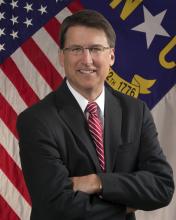
North Carolina Muslims hope they can persuade Gov. Pat McCrory, a Republican, to veto a bill that prohibits state judges from considering “foreign law.”
“It’s going to be tough,” said Rose Hamid of Charlotte. “But I do believe there is a chance.”
Muslims across the state oppose the bill they think is motivated by intolerance and may potentially infringe on other religious groups. Bills against judicial consideration of “foreign laws” are believed to really be opposing Shariah, or Islamic law.
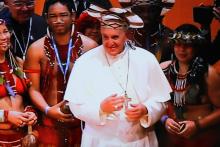
In one of the most inclusive gestures of his visit here, Pope Francis donned a headdress offered to him from an indigenous South American Indian at a ceremony in the city´s grand municipal theater.
The gesture was greeted with shouts of surprise initially. Then the audience of Brazilian politicians and business people erupted into roars of approval and thunderous applause.
It was a compelling moment. Moments earlier, the pope had spoken about the state´s responsibility to respect and encourage “peaceful coexistence between different religions.”

It’s not every day that the pope drops in for a visit to your home. But Maria da Penha dos Santos lucked out when Pope Francis chose to enter her small yellow two-story house in the rundown slum of Varginha.
The Thursday morning visit came on the fourth day of the pontiff’s weeklong World Youth Day tour. Santos’ house was one of seven earmarked for a visit.
She was waiting outside with her husband, daughter, and granddaughter when the pope stopped in front and told her “we have a beautiful family and he had loved us even before we had met.”
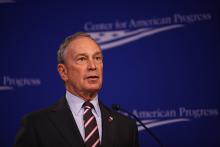
Muslim-American civil rights groups are criticizing New York City Mayor Michael Bloomberg for vetoing a bill on Tuesday that would have created an independent inspector general to oversee the New York City Police Department.
The New York City Council passed the bill June 27 as a check against controversial NYPD policies that critics say violate the civil rights of Muslim and other minority New Yorkers. Reports that the NYPD spied on mosques, Muslim businesses, organizations, and students began surfacing in 2011.
“The NYPD is out of control and discriminates against innocent Americans, and Mayor Bloomberg has let Americans down by allowing the NYPD to use discriminatory policies without any accountability,” said Glenn Katon, legal director for Muslim Advocates, a civil rights group based in San Francisco.

North Carolina lawmakers on Wednesday approved a bill to prohibit judges from considering “foreign laws” in their decisions, but nearly everyone agrees that “foreign laws” really means Shariah, or Islamic law.
North Carolina now joins six other states — Oklahoma, Arizona, Kansas, Louisiana, South Dakota, and Tennessee — to pass a “foreign laws” bill. A similar bill passed in Missouri, but Gov. Jay Nixon vetoed it, citing threats to international adoptions.
The bills all cite “foreign laws” because two federal courts have ruled that singling out Shariah — as Oklahoma voters originally did in 2010 — is unconstitutional.